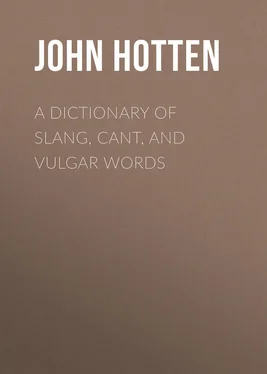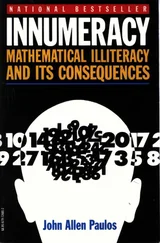John Hotten - A Dictionary of Slang, Cant, and Vulgar Words
Здесь есть возможность читать онлайн «John Hotten - A Dictionary of Slang, Cant, and Vulgar Words» — ознакомительный отрывок электронной книги совершенно бесплатно, а после прочтения отрывка купить полную версию. В некоторых случаях можно слушать аудио, скачать через торрент в формате fb2 и присутствует краткое содержание. ISBN: , Жанр: foreign_antique, foreign_prose, на английском языке. Описание произведения, (предисловие) а так же отзывы посетителей доступны на портале библиотеки ЛибКат.
- Название:A Dictionary of Slang, Cant, and Vulgar Words
- Автор:
- Жанр:
- Год:неизвестен
- ISBN:http://www.gutenberg.org/ebooks/47018
- Рейтинг книги:3 / 5. Голосов: 1
-
Избранное:Добавить в избранное
- Отзывы:
-
Ваша оценка:
- 60
- 1
- 2
- 3
- 4
- 5
A Dictionary of Slang, Cant, and Vulgar Words: краткое содержание, описание и аннотация
Предлагаем к чтению аннотацию, описание, краткое содержание или предисловие (зависит от того, что написал сам автор книги «A Dictionary of Slang, Cant, and Vulgar Words»). Если вы не нашли необходимую информацию о книге — напишите в комментариях, мы постараемся отыскать её.
A Dictionary of Slang, Cant, and Vulgar Words — читать онлайн ознакомительный отрывок
Ниже представлен текст книги, разбитый по страницам. Система сохранения места последней прочитанной страницы, позволяет с удобством читать онлайн бесплатно книгу «A Dictionary of Slang, Cant, and Vulgar Words», без необходимости каждый раз заново искать на чём Вы остановились. Поставьте закладку, и сможете в любой момент перейти на страницу, на которой закончили чтение.
Интервал:
Закладка:
Tom Brown, of “facetious memory,” as his friends were wont to say, and Ned Ward, who wrote humorous books, and when tired drew beer for his customers at his ale-house in Long Acre, 38were both great producers of Slang in the last century, and to them we owe many popular current phrases and household words.
Written Slang was checked rather than advanced by the pens of Addison, Johnson, and Goldsmith, although John Bee, the bottle-holder and historiographer of the pugilistic band of brothers in the youthful days of flat-nosed Tom Crib, has gravely stated that Johnson, when young and rakish, contributed to an early volume of the Gentleman’s Magazine a few pages, by way of specimen, of a Slang dictionary, the result, Mr. Bee says, “of his midnight ramblings!” 39And Goldsmith, I must not forget to remark, certainly coined a few words, although, as a rule, his pen was pure and graceful, and adverse to neologisms. The word FUDGE, it has been stated, was first used by him in literary composition, although it originated with one Captain Fudge, a notorious fibber, nearly a century before. Street-phrases, nick-names, and vulgar words were continually being added to the great stock of popular Slang up to the commencement of the present century, when it received numerous additions from pugilism, horse-racing, and “fast” life generally, which suddenly came into great public favour, and was at its height when the Prince Regent was in his rakish minority. Slang in those days was generally termed FLASH language. So popular was it with the “bloods” of high life that it constituted the best paying literary capital for certain authors and dramatists. Pierce Egan issued Boxiana , and Life in London , six portly octavo volumes, crammed with Slang; and Moncrieff wrote the most popular farce of the day, Tom and Jerry (adapted from the latter work), which, to use newspaper Slang, “took the town by storm,” and, with its then fashionable vulgarisms, made the fortune of the old Adelphi Theatre, and was, without exception, the most wonderful instance of a continuous theatrical RUN in ancient or modern times. This, also, was brimful of Slang. Other authors helped to popularise and extend Slang down to our own time, when it has taken a somewhat different turn, dropping many of the Cant and old vulgar words, and assuming a certain quaint and fashionable phraseology – Frenchy, familiar, utilitarian, and jovial. There can be no doubt but that common speech is greatly influenced by fashion, fresh manners, and that general change of ideas which steals over a people once in a generation. But before I proceed further into the region of Slang , it will be well to say something on the etymology of the word.
The word Slang is only mentioned by two lexicographers – Webster and Ogilvie. Johnson, Walker, and the older compilers of dictionaries, give slang the preterite of sling , but not a word about Slang in the sense of low, vulgar, or unrecognised language. The origin of the word has often been asked for in literary journals and books, but only one man, as far as I can learn, has ever hazarded an etymology – Jonathan Bee, the vulgar chronicler of the prize-ring. 40With a recklessness peculiar to pugilism, Bee stated that Slang was derived from “the slangs or fetters worn by prisoners, having acquired that name from the manner in which they were worn, as they required a sling of string to keep them off the ground.” Bee had just been nettled at Pierce Egan producing a new edition of Grose’s Dictionary of the Vulgar Tongue , and was determined to excel him in a vulgar dictionary of his own, which should be more racy, more pugilistic, and more original. How far he succeeded in this latter particular his ridiculous etymology of Slang will show. Slang is not an English word, it is the Gipsey term for their secret language, and its synonyme is GIBBERISH – another word which was believed to have had no distinct origin. 41Grose – stout and burly Captain Grose – who we may characterise as the greatest antiquary, joker, and drinker of porter of his day, was the first author who put the word Slang into print. It occurs in his Classical Dictionary of the Vulgar Tongue , of 1785, with the signification that it implies “Cant or vulgar language.” Grose, I may remark in passing, was a great favourite with the poet Burns, and so pleased by his extensive powers of story-telling and grog-imbibing, that the companionable and humour-loving Scotch bard wrote for his fat friend – or, to use his own words, “the fine, fat, fodgel wight” – the immortal poem of “Tam O’Shanter.”
Without troubling the reader with a long account of the transformation into an English term of the word Slang, I may remark in passing that it is easily seen how we obtained it from the Gipseys. Hucksters and beggars on tramp, or at fairs and races, associate and frequently join in any rough enterprise with the Gipseys. The word would be continually heard by them, and would in this manner soon become Cant; 42and, when carried by “fast” or vulgar fashionables from the society of thieves and low characters to their own drawing-rooms, would as quickly become Slang, and the representative term for all vulgar or Slang language.
Any sudden excitement, peculiar circumstance, or popular literary production, is quite sufficient to originate and set going a score of Slang words. Nearly every election or public agitation throws out offshoots of the excitement, or scintillations of the humour in the shape of Slang terms – vulgar at first, but at length adopted as semi-respectable from the force of habit and custom. There is scarcely a condition or calling in life that does not possess its own peculiar Slang. The professions, legal and medical, have each familiar and unauthorised terms for peculiar circumstances and things, and I am quite certain that the clerical calling, or “ the cloth ,” is not entirely free from this peculiarity. Every workshop, warehouse, factory, and mill throughout the country has its Slang, and so have the public schools of Eton, Harrow, and Westminster, and the great Universities of Oxford and Cambridge. Sea Slang constitutes the principal charm of a sailor’s “yarn,” and our soldiers and officers have each their peculiar nicknames and terms for things and subjects proper and improper. A writer in Household Words (No. 183) has gone so far as to remark, that a person “shall not read one single parliamentary debate, as reported in a first-class newspaper, without meeting scores of Slang words;” and “that from Mr. Speaker in his chair, to the Cabinet Ministers whispering behind it – from mover to seconder, from true blue Protectionist to extremest Radical – Mr. Barry’s New House echoes and re-echoes with Slang.” Really it seems as if our boasted English tongue was a very paltry and ill-provided contrivance after all; or can it be that we are the most vulgar of people?
The universality of Slang is extraordinary. Let any person for a short time narrowly examine the conversation of their dearest and nearest friends, aye, censor-like, even slice and analyse their own supposed correct talk, and they shall be amazed at the numerous unauthorised, and what we can only call vulgar, words they continually employ. It is not the number of new words that we are ever introducing that is so reprehensible, there is not so much harm in this practice (frequently termed in books “the license of expression”) if neologisms are really required, but it is the continually encumbering of old words with fresh and strange meanings. Look at those simple and useful verbs, do , cut , go , and take , and see how they are hampered and overloaded, and then let us ask ourselves how it is that a French or German gentleman, be he ever so well educated, is continually blundering and floundering amongst our little words when trying to make himself understood in an ordinary conversation. He may have studied our language the required time, and have gone through the usual amount of “grinding,” and practised the common allotment of patience, but all to no purpose as far as accuracy is concerned. I am aware that most new words are generally regarded as Slang, although afterwards they may become useful and respectable additions to our standard dictionaries. Jabber and HOAX were Slang and Cant terms in Swift’s time; so indeed were MOB and SHAM. 43Words directly from the Latin and Greek, and Carlyleisms, are allowed by an indulgent public to pass and take their places in books. Sound contributes many Slang words – a source that etymologists too frequently overlook. Nothing pleases an ignorant person more than a high-sounding term “full of fury.” How melodious and drum-like are those vulgar coruscations RUMBUMPTIOUS, SLANTINGDICULAR, SPLENDIFEROUS, RUMBUSTIOUS, and FERRICADOUZER. What a “pull” the sharp-nosed lodging-house keeper thinks she has over her victims if she can but hurl such testimonies of a liberal education at them when they are disputing her charges, and threatening to ABSQUATULATE! In the United States the vulgar-genteel even excel the poor “stuck-up” Cockneys in their formation of a native fashionable language. How charming to a refined ear are ABSKIZE, CATAWAMPOUSLY, EXFLUNCTIFY, OBSCUTE, KESLOSH, KESOUSE, KESWOLLOP, and KEWHOLLUX! Vulgar words representing action and brisk movement often owe their origin to sound. Mispronunciation, too, is another great source of vulgar or slang words – RAMSHACKLE, SHACKLY, NARY-ONE for neither, or neither one, OTTOMY for anatomy, RENCH for rinse, are specimens. The commonalty dislike frequently occurring words difficult of pronunciation, and so we have the street abridgments of BIMEBY for by and by, CAZE for because, GIN for given, HANKERCHER for handkerchief, RUMATIZ for rheumatism, BACKY for tobacco, and many others, not perhaps Slang, but certainly all vulgarisms. Archbishop Whately, in his interesting Remains of Bishop Copleston , has inserted a leaf from the Bishop’s note-book on the popular corruption of names, mentioning among others KICKSHAWS, as from the French, quelques choses ; BEEFEATER, the lubberly guardian of royalty in a procession, and the supposed devourer of enormous beefsteaks, as but a vulgar pronunciation of the French, buffetier ; and GEORGE and CANNON, the sign of a public-house, as nothing but a corruption (although so soon!) of the popular premier of the last generation, George Canning . Literature has its Slang terms; and the desire on the part of writers to say funny and startling things in a novel and curious way (the late Household Words , 44for instance), contributes many unauthorised words to the great stock of Slang.
Читать дальшеИнтервал:
Закладка:
Похожие книги на «A Dictionary of Slang, Cant, and Vulgar Words»
Представляем Вашему вниманию похожие книги на «A Dictionary of Slang, Cant, and Vulgar Words» списком для выбора. Мы отобрали схожую по названию и смыслу литературу в надежде предоставить читателям больше вариантов отыскать новые, интересные, ещё непрочитанные произведения.
Обсуждение, отзывы о книге «A Dictionary of Slang, Cant, and Vulgar Words» и просто собственные мнения читателей. Оставьте ваши комментарии, напишите, что Вы думаете о произведении, его смысле или главных героях. Укажите что конкретно понравилось, а что нет, и почему Вы так считаете.












